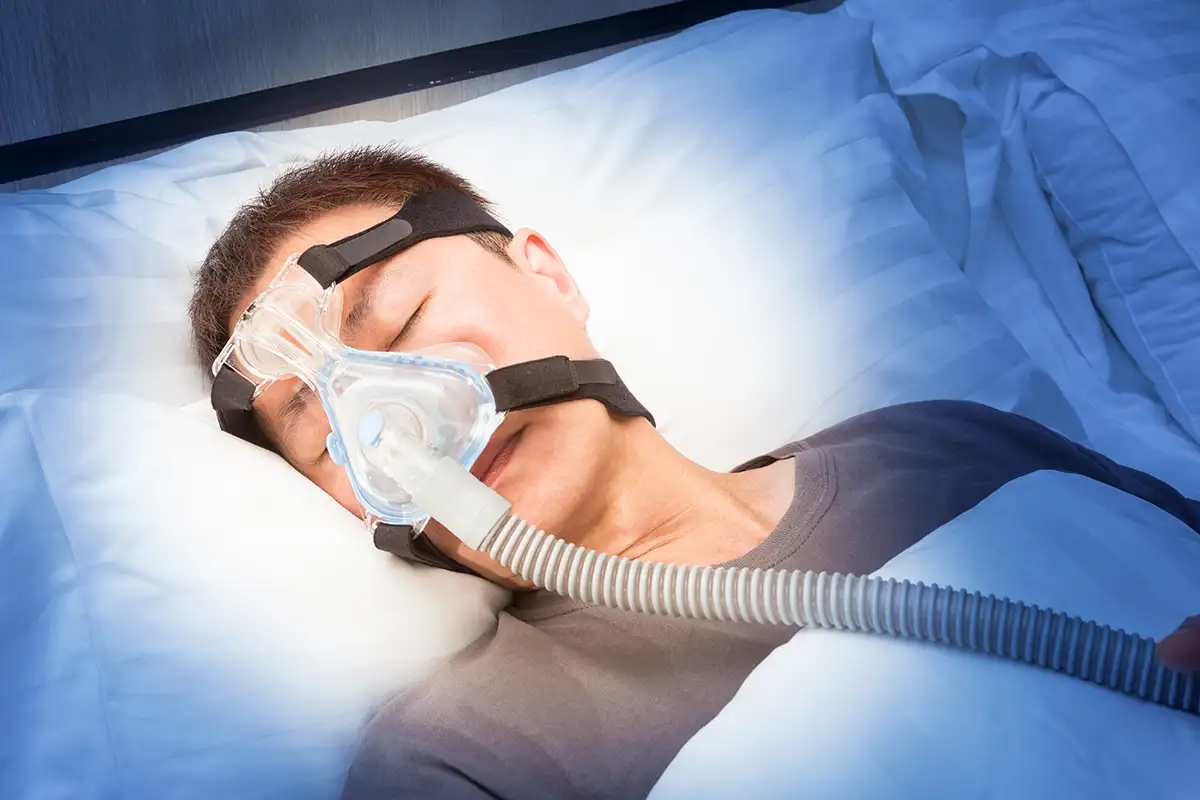The Philips CPAP recall and lawsuit concerns the Continuous Positive Airway Pressure or CPAP machines produced by Philips Respironics, a sleep apnea and home respiratory care company. As one of the most recognized names in sleep apnea care, the 2021 recall of their flagship CPAP machine came as a shock.
CPAP machines are meant to be long-lasting pieces of medical equipment that those with sleep conditions can use every night to breathe better. The machines work by opening the user’s airways with pressure and holding them open during sleep using a constant stream of clean air.
Due to hazardous chemicals used in the making of the machines, a Philips CPAP lawsuit has now been filed as a multi-district litigation or MDL. Continue reading to learn about the Philips CPAP recall and learn whether you might be eligible for compensation if you were injured from the use of Philips medical equipment.
Philips CPAP Recall Update
The discovery of polyester polyurethane foam in the construction of these machines has resulted in the Philips CPAP recall. This foam was used by the manufacturer to reduce the noise and vibration that the machines make while turned on. The problem is that during normal use, this foam can break off and disperse particulates into the air passages of the machine, leading to the user breathing or swallowing potentially toxic chemicals.
CPAP machines have been well-documented for their beneficial uses for those suffering from severe sleep apnea. As a result, those who most benefit from the machine likely use them every night, increasing their exposure to the toxins in the foam, which could include a mix of benzene, chlorine, formaldehyde, perfluorooctyl sulfonate, and other chemical solvents.
These are similar to the chemicals that can off-gas from a new foam mattress but to a much greater extent of exposure. Breathing in these gasses and even the foam itself from the airways of a CPAP machine can potentially expose the user to health-threatening levels of carcinogens, necessitating the recall of certain Philips CPAP machines.
Which CPAP Machines are Being Recalled by Philips?
Several Philips machines have been recalled for their use of polyurethane padding, including CPAP, BiPAP, and ventilators. BiPAP machines use a similar mechanism, but they differ due to differences in their construction, which changes their intended use.
CPAP machines are used to treat obstructive sleep apnea and are the first line of defense against sleep-obstructing respiratory issues. CPAP machines come in at-home as well as travel versions. By contrast, BiPAP machines are more intense and are usually only prescribed if a user cannot tolerate CPAP or suffers from severe central sleep apnea.
Unlike CPAP, BiPAP machines can be used at home to help those with neurological or lung disorders restructure their airways for healthy sleep. Since BiPAP treatment is more expensive, most insurers only cover it if the user can medically prove that CPAP treatment is insufficient for their issues.
As a result, while both CPAP and BiPAP machines were recalled due to their similar methods of construction, including their use of the noise-reducing foam, CPAP machines are far more commonly used, making them more central to the current Philips CPAP lawsuit than the company’s other ventilators.
Philips CPAP Lawsuit
The Philips CPAP lawsuit is a multi-district litigation against the medical sleep equipment manufacturer, Philips, for a potentially harmful flaw in their sleep apnea machines. The June 2021 Philips CPAP recall was followed by an announcement in September 2021 that the harmful foam additives would be replaced in the 3.5 million recalled machines. However, an FDA update in November 2021 found that the replacement foam posed a similar safety risk.
In the course of the FDA’s investigation into Philips, they found company communication confirming that Philips knew about the potential of the polyurethane foam to break off into the airways of the user as the machines aged. However, they chose to maintain their relationship with their raw foam supplier and not change the machines’ design.
Over 400 individual cases and over a dozen company cases have been filed against Philips seeking restitution for damages they claim were caused by the use of recalled CPAP machines. Philips has cited scientific studies demonstrating that inhaling foam from CPAP machines does not have a verified link to cancer while the plaintiffs argue that they never would have purchased Philips products had they known of the risks beforehand.
Philips CPAP Lawsuit Claims
The Philips CPAP lawsuit claims focus on the alleged symptoms of using defective CPAP machines as well as the potential long-term health injuries, including many types of cancer. As of February 2023, the FDA has over 98,000 reports from medical device investigations linking 346 deaths to exposure to polyurethane foam in Philips machines in 2021 and 2022, though Philip has noted that the link to these deaths has not been confirmed to be related to the content of the recall itself.
Philips CPAP Injuries
The injuries reported in the Philips CPAP lawsuit include many life-threatening illnesses such as pneumonia, infection, asthma, liver and kidney damage, severe throat, nose, or ear inflammation, heart attack or heart failure, acute respiratory distress, and reactive airway disease.
In addition to these conditions, the recalled CPAP machines have been claimed to cause numerous types of cancer, including:
- Kidney
- Bladder
- Brain
- Breast
- Leukemia
- Lymphoma
- Lung
- Stomach
- Nasal
- Prostate
- Rectal
- Testicular
- Thyroid
- And more
In addition to the listed cancers, these organs or other related systems could be fatally damaged by ingesting the chemicals in Philips CPAP machines, causing multiple myeloma, chemical poisoning, hematopoietic cancers, respiratory failure, papillary carcinoma, or a host of other life-altering or fatal conditions.
Philips CPAP Foam Exposure Symptoms
The plaintiffs have claimed that exposure to the foam in Philips CPAP machines can cause numerous symptoms related to or in addition to the conditions described above. They can be a warning sign for cancers and other deadly illnesses potentially caused by exposure to polyurethane foam or they can be a self-contained reaction to the toxins, depending on how long the plaintiff has used the machine.
The primary symptoms allegedly linked to Philips CPAP foam exposure include:
- Asthma and other airway irritation
- Cough
- Headache
- Dizziness
- Inflammation
- Nausea
- Vomiting
- Chest pressure
- Sinus infections
Irritation or inflammation of the airways, skin, eyes, lungs, nose, or throat is reported to be the first sign of adverse effects from exposure to the foam in Philips CPAP machines. You may be entitled to compensation if you experienced any of these effects, even if you didn’t contract cancer. Remember that claims for compensation include not only current medical expenses but potential injuries from hidden organ damage you may have to deal with in the future.
Philips CPAP Lawsuit Settlements
Philips CPAP lawsuit settlements could be as high as $500,000, with a predicted average settlement amount of around $150,000. Given the recency of the Philips CPAP lawsuit, however, the courts haven’t settled on an average settlement amount for those who claim to be injured from using Philips devices.
The amount you can expect to be awarded from the newly-consolidated MDL depends on the injuries you’ve sustained as well as the amount of time you used the machine. Studies show that as little as 6 months of CPAP use is enough for the foam’s chemical particles to begin causing symptoms.
Those who have used it for years will likely be eligible for even more compensation.
Who Qualifies for the Philips CPAP Lawsuit?
Those who qualify for the Philips CPAP lawsuit must have used one of the recalled Philips machines and must be younger than 80 years old. This is because the risks of cancer and other symptoms that overlap with the adverse effects reported from Philips CPAP use rise over the age of 80, regardless of CPAP usage.
Even those who have not suffered the qualifying types of cancers may be eligible for a Philips CPAP lawsuit if they were injured by one of the recalled machines, though such a case would be harder to prove. It’s important to speak with an accredited personal injury attorney about the possibility of filing your case in the ongoing Philips MDL.
How to File a Philips CPAP Lawsuit?
To file a Philips CPAP lawsuit, you must have documentation verifying your ownership of one of the recalled machines and of the injuries you sustained. This could include a receipt for the purchase of the machine as well as doctor’s notes, treatment records, medication receipts, or more confirming the symptoms of conditions you have contracted since using the machine.
Remember that to file a Philips CPAP lawsuit, you must act within your state’s statute of limitations for personal injury cases. This statute is the time you have from becoming aware of the dangers of the device to file your case, and it differs by state. While the average is 2-4 years, some states such as Maine have a 6-year statute while others such as Louisiana and Kentucky limit it to one year.
The evidence documenting your injuries includes not only receipts and medical notes but also any evidence pointing to the loss of potential or pain and suffering caused by the damage. This could include work slips for missed work, proof of termination, or a mental therapist’s notes.
Combining this evidence into a successful case is difficult without the help of an expert. This is why the most important step in filing a Philips CPAP lawsuit is to contact an experienced personal injury lawyer who knows the case and can help you get the compensation you deserve.
Conclusion
The Philips CPAP recall began with the company’s voluntary removal of over 3.5 million of their sleep apnea medical devices, including CPAP, BiPAP, and their variants, from shelves. The FDA’s investigation into the polyurethane foam contained in these machines led to allegations that when inhaled, the toxins in Philips machines could cause cancer and a host of other symptoms.
If you have used a Philips CPAP machine for at least 6 months and have been diagnosed with any of the eligible conditions, contact an experienced personal injury attorney to learn about your case eligibility and get the compensation you deserve for the injuries you have sustained.

Rocky Horton
Author
Rocky Horton is a health and safety expert from Chapel Hill, NC. He is the founder of AccidentAdvisor and has been featured in Forbes, Bloomberg, and other publications. Learn more.













